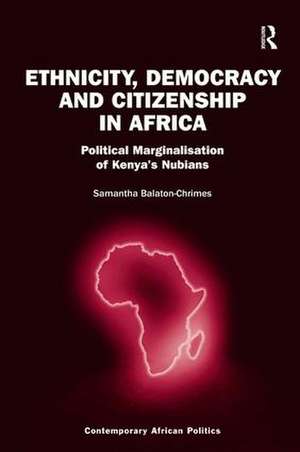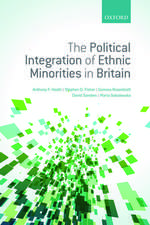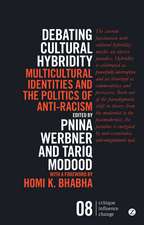Ethnicity, Democracy and Citizenship in Africa: Political Marginalisation of Kenya's Nubians: Contemporary African Politics
Autor Samantha Balaton-Chrimesen Limba Engleză Hardback – 28 feb 2015
| Toate formatele și edițiile | Preț | Express |
|---|---|---|
| Paperback (1) | 325.34 lei 6-8 săpt. | |
| Taylor & Francis – 13 iul 2017 | 325.34 lei 6-8 săpt. | |
| Hardback (1) | 1057.09 lei 6-8 săpt. | |
| Taylor & Francis – 28 feb 2015 | 1057.09 lei 6-8 săpt. |
Preț: 1057.09 lei
Preț vechi: 1289.13 lei
-18% Nou
Puncte Express: 1586
Preț estimativ în valută:
202.26€ • 211.21$ • 167.03£
202.26€ • 211.21$ • 167.03£
Carte tipărită la comandă
Livrare economică 15-29 aprilie
Preluare comenzi: 021 569.72.76
Specificații
ISBN-13: 9781472440662
ISBN-10: 1472440668
Pagini: 202
Dimensiuni: 156 x 234 x 13 mm
Greutate: 0.52 kg
Ediția:1
Editura: Taylor & Francis
Colecția Routledge
Seria Contemporary African Politics
Locul publicării:Oxford, United Kingdom
ISBN-10: 1472440668
Pagini: 202
Dimensiuni: 156 x 234 x 13 mm
Greutate: 0.52 kg
Ediția:1
Editura: Taylor & Francis
Colecția Routledge
Seria Contemporary African Politics
Locul publicării:Oxford, United Kingdom
Notă biografică
Dr Samantha Balaton-Chrimes is a Lecturer in International Studies in the School of Humanities and Social Sciences at Deakin University, Melbourne, Australia. Sam’s research is interdisciplinary in nature, cutting across politics and political theory, development studies and anthropology. Her principal research interests are in the areas of democratic theory and practice in global perspective, with a focus on how minorities and marginalised groups can access, participate in, and transform democratic processes, and make effective use of their rights, particularly in relation to land.
Recenzii
’At a time when ethnic identities are becoming more politically salient this book provides an invaluable account of their appeal to ordinary Kenyans. Balaton-Chrimes provides a nuanced account of the relationship between perceptions of indigeneity and autochthony, and citizenship, but also practical suggestions on how the negative aspects of ethnic politics can be mitigated in a modern democracy.’ Gabrielle Lynch, University of Warwick, UK ’This book brings the tormented history of the Nubians to new life by opening up broader and unexpected implications. Once the soldiers of choice for the British colonial armies, these Nubians now desperately defend their belonging as citizens of Kenya by claiming Kibera, one of Nairobi’s most overpopulated slums, as their ethnic homeland, invoking a doubtful colonial charter. Balaton-Chrimes creatively shows how this tortuous history raises important questions to notions of citizenship in general. Thus, she highlights how contributions from the South can open up new vistas to current debates in the North. At least as important is that her emphasis on a disaggregated approach to citizenship allows her to link it in positive and even promising ways to notions of ethnicity and autochthony.’ Peter Geschiere, University of Amsterdam, The Netherlands
Cuprins
Introduction; Chapter 1 The Nubians and Kenya’s Ethnic History; Chapter 2 ID Cards and the Limits of Citizenship as Status; Chapter 3 Indigeneity and Collective Recognition; Chapter 4 Autochthony and Belonging; Chapter 5 Ethnicity and Democratic Citizenship; Chapter 101 Conclusion;
Descriere
This book explores two kinds of citizenship deficits: those experienced by the Nubians in Kenya and, more centrally, those which represent the limits of citizenship theories. The author argues for an understanding of citizenship as made up of multiple component parts: status, rights and membership, which are often disaggregated through time, across geographic spaces and amongst different people. This departure from a unitary language of citizenship allows a novel analysis of the central role of ethnicity in the recognition of political membership and distribution of political goods in Kenya. Such an analysis generates important insights into the risks and possibilities of a relationship between ethnicity and democracy that is of broad, global relevance.


























